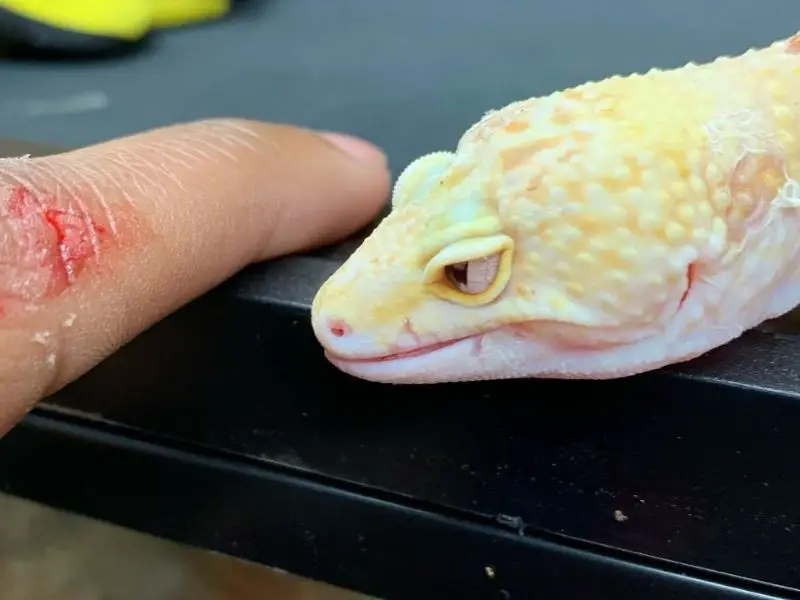Leopard geckos can bite if they feel threatened. If you’re a new pet owner, it is important to know what to do if your leo bites you as there are times when infections can result from the bite. Here’s a guide on leopard gecko bites, whether they hurt and infect; and how to prevent the gecko from biting and being too aggressive.
Do leopard geckos bite?

Leopard geckos do not bite humans unless when they’re in distress, excited, hungry, or scared. In fact, pet geckos rarely do anything to harm their owners at all. Owners must take care when handling leopard geckos because of the potential for being nipped by a scared or defensive animal.
You’ll know your leopard gecko is scared and ready to bite when it has its mouth wide open, is turning around at an unusually high rate of speed, and making a hissing noise.
Leopard geckos hardly bite humans because they are typically shy creatures that’ll always want to avoid confrontation with anything larger than themselves. They may be nippy when frightened or picking up something new though. Therefore, you should always be careful when handling them.
Some bites are often more of an accident than a deliberate act on the part of the reptile pet. However, they only have small teeth so they can’t really bite hard or chew anything up with them, and their mouth is made for eating insects, not humans.
What happens if a leopard gecko bites you?
In case a leopard gecko bites you, it will let go after a moment and then slink away. Unlike some other gecko species, leopard geckos do not have big teeth to cause any damage.
If the bite causes bleeding, it would be wise to see a doctor as soon as possible. This is to make sure that the bite did not cause any infections or abscesses.
If it’s determined in a doctor’s examination that you were bitten by a leopard gecko, there is no need to worry about rabies as this issue only applies to mammals and reptiles with fur and scales (for example bats).
Does a leopard gecko bite hurt?
In some cases, a leopard gecko’s bite can hurt if it’s a rough bite. The gecko has small teeth and the human skin is usually very delicate so the pain can’t be felt as easily as with other animals that have hard, sharp teeth.
The bite pressure of a leopard gecko is not that strong due to its small size. The sensation of the bite may be painful but it’s also very unusual.
The small, sharp teeth mean that the pressure for biting isn’t as high as with other animals like dogs or cats that have large, hard teeth. The pain will only occur if there was roughness involved in the biting process (i.e., slamming down on someone) so bites should never hurt too much unless there are multiple bites at once or an injury sustained beforehand. The grip of this lizard is usually gentle enough.
The pain from a leopard gecko bite will last for just about 24 hours after being bitten by one of these lizards.
The scars will be harder to see because of the small teeth that leopard geckos have. The pain from a bite should not last more than 24 hours and usually does not leave any scars if you do everything properly after being bitten.
Why do male leopard geckos bite a lot?
Male leopard geckos are usually more aggressive than females. They are also territorial and like to establish dominance, so they bite a lot of the time because they’re trying to show you who’s boss (or something).
The key is understanding that male leopard geckos need more space than females do, as well as appropriate social interactions with other males. You can prevent aggression by setting up the cage correctly and making sure there are no hiding spots for your gecko to feel cornered or threatened in any way possible.
Male leopard geckos will only become friendlier once they feel safe enough around you!
READ ALSO: Male vs Female Leopard Gecko – How to Tell the Differences
Do leopard geckos have salmonella?
The bite from a leopard gecko is not a concern. The chance of contracting salmonella from the bite is low, and there have been no documented cases of it happening in humans to date.
Usually, the risk for infection comes from handling leopard geckos or their poop with your bare hands. Therefore, it’s important to wash your hands thoroughly after handling leopard geckos, and it is recommended that you wear gloves while working with the animals.
If you were bitten by a leopard gecko or you think your child was bitten (the infection from salmonella can be serious in young children), please contact your healthcare provider immediately for advice.
What to do if a leopard gecko bites you
If you’re bitten by a leopard gecko, it’s important to know what you should do. The first thing that needs to be done is to clean the spot of the bite with soap and water and then apply an antibiotic ointment like Neosporin or Polysporin on top of your skin with a sterile bandage if needed.
There are some signs which may indicate when someone has been bitten by a reptile:
- swelling around the wound area
- redness at the site of infection (commonly near the mouth)
- pain in the injured region
- nausea/vomiting
If any of these symptoms occur, call for medical help right away as they could lead to more serious health complications.
How to prevent a leopard gecko bite
Aggression in leopard geckos is caused by a number of factors including stress, lack of stimulation, and territorial disputes.
There are a few things you can do to prevent leopard gecko bites:
- Make sure your geckos have plenty of space by providing hiding spots in the tank or vivarium with places for each individual animal (plastic hidey houses make excellent hides).
- Provide enrichment items such as tall plants, logs with the bark on them, and cave-like structures that will provide additional surfaces for climbing.
- Create different levels in the enclosure so there is more than just the floor available for exploring. This doesn’t mean you need an elaborate setup; it could be something as simple as stacking some platforms together to create a variation from one surface to another.
Pro tip: Be careful when handling your leopard gecko because some individuals behave like prey species and will react defensively when picked up.
Is it safe to hold my leopard gecko?
There are times when your leopard gecko will be aggressive and these include:
- When it is mating season.
- When your leopard gecko is shedding.
- After being disturbed from its home or when you have touched the gecko for too long without feeding it properly.
If your leopard gecko is aggressive, stop trying to touch it and try again in a few hours after giving them some time alone to calm down.
References + Resources
- JON T. SAKATA et al, Institute for Neuroscience, University of Texas at Austin, Section for Integrative Biology, School of Biological Sciences, University of Texas at Austin: Social experience affects territorial and reproductive behaviours in male leopard geckos
- ROBERT PREIDT, 2015, CBS News: Pet geckos can make people sick
- GILLIAN MOHNEY, 2015: Geckos Linked to Dangerous Salmonella Outbreak in 16 States
READ NEXT: Leopard Geckos Fighting: Reasons and Solutions for Aggression

